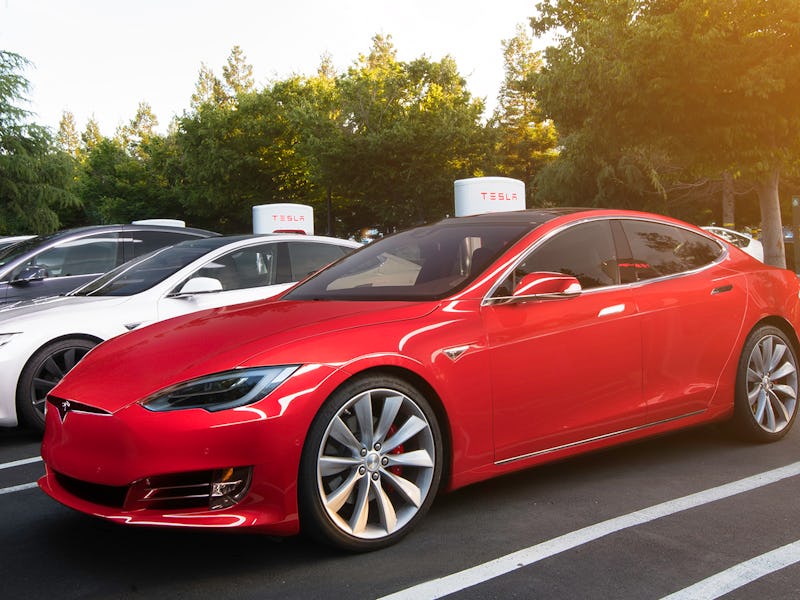Tesla’s secret project could make electric cars cheaper and boost range
The company is working on something big in its labs.

Tesla is working on a new battery project that could bring prices down and offer much greater energy density. The project, named "Roadrunner," could help the company reach the holy grail of a battery price that enables electric cars to outpace their gasoline alternatives.
On Wednesday, Electrek claimed the company is looking to build its own batteries in-house, a marked change from the current setup where Tesla partners with Panasonic. This relationship has appeared shaky in recent months, and on Wednesday Panasonic announced it would no longer produce solar products at Giga New York. The new project would leverage some of the firm's recent advancements in batteries, like its acquisition of Maxwell Technologies and research from Jeff Dahn.
It could be a major break for Tesla, which enables it to offer a more competitive battery on a number of key metrics. A cheaper battery could enable Tesla to offer cars cheaper than the $35,000 Model 3, and Musk claimed in August 2018 that it could offer a $25,000 car in four years. Tom Raftery, a global vice present for SAP, described a battery that costs $100 per kilowatt-hour as "widely agreed to be the figure where EVs and ICE vehicles will have a comparable upfront purchase price."
Greater energy density could also mean that a car could use a lighter battery, or improve the range at the same weight. It could also pave the way for more exotic uses, like an electric jet.
The report claims that project "Roadrunner" is making a number of internal moves:
- It has tested a Tesla-made prototype battery internally, as part of an effort over the past few months to quietly develop a pilot production line at the Fremont facility.
- As part of the shift to the new cells, Tesla aims to improve the module and battery packs.
- One idea suggested for these new battery packs is the move toward laser welding instead of wire bonding for the cells.
- Musk is pushing to have a Tesla-made battery pack ready for a Tesla Model S or Model X for the planned April company event.
- At the April event, Tesla is expected to announce the production of the cells in the United States, China and Europe.
It's unclear how much a Tesla battery costs at the moment, but evidence suggests its prices have dropped dramatically over the years. BloombergNEF research found batteries in the wider industry cost $1,183 per kilowatt-hour in 2010, a figure that dropped to $293 by 2016 and $156 by 2019. The company claimed in early 2016 that its batteries cost less than $190 per kilowatt-hour, and it planned to reach $100 by 2020.
An early version of the Tesla Model S.
From there, the answers grow murky. Third-party analysis suggested in December 2018 that Tesla had reached $116, while other automakers were still around $146. Cairn Energy Research Advisors claimed to CNBC this month that Tesla likely reached $158 last year while other automakers were over $200. But in a January 2019 earnings call, Musk described price per kilowatt as a “highly proprietary number" and refused to divulge the company's current prices.
Tesla has tried to develop its own batteries before. Tesla started working with Panasonic in 2010, in time to supply the Model S in 2012. The Wall Street Journal claimed in October 2019 that Musk was not happy with the price of batteries and the company spent months trying to build its own internally. These plans were scrapped and the company stuck with Panasonic for the Model S launch.
The report suggests that Tesla's plans were revitalized with the acquisition of Maxwell Technologies in February 2019 for $218 million. The company has been known for exploring technologies like ultracapacitors, which were going to be the subject of Musk's PhD at Stanford University before he dropped out. Maxwell has also explored dry electrodes, and in a presentation the month prior the company claimed it could reduce battery costs by 20 percent, increase production capacity by a factor of 16, and offer double the battery life.
Perhaps most intriguing is Maxwell's claim that dry electrodes could offer a path to far denser batteries. BloombergNEF's research found that cell density has increased in the industry from around 100 watt-hours per kilogram to nearly 300 watt-hours per kilogram. But Maxwell's presentation claimed it had identified a path to 500 watt-hours. This happens to be the sort of figure Musk believes is necessary to power an electric jet.
Tesla's rendering of a completed Giga Nevada.
Panasonic's withdrawal from the Tesla solar factory, announced Wednesday, was coupled with an affirmation that it would stay at Giga Nevada and continue to produce batteries. But the announcement comes at a time of strained relations between the two firms, with reports suggesting an internal culture clash. Tesla executives have made several comments suggesting it aims to vertically integrate more of the battery supply chain into its operations.
It wouldn't be the first time Tesla has parted ways with a third party to use its own solution. A famous example is its split with computer vision firm MobilEye in July 2016. MobilEye supplied Tesla vehicles with the necessary components to power the semi-autonomous Autopilot system. Starting from October 2016, all Tesla vehicles have shipped with a suite of cameras and sensors that it claims will be enough to offer fully autonomous driving. All that would be required, according to Tesla, is a software and computer upgrade.
When Tesla hosts its company presentation in April, it may start to produce another key component of its cars in-house.